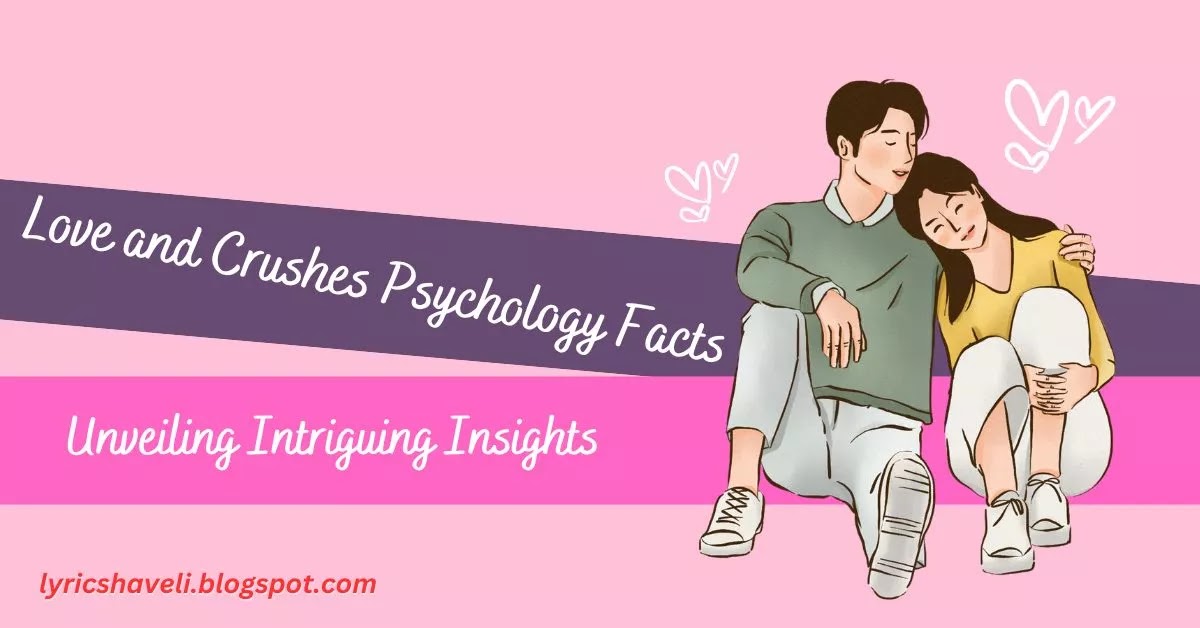Love can be defined as a deep affection or attachment towards someone, often accompanied by a strong desire for emotional intimacy, companionship, and romantic involvement. On the other hand, crushes refer to infatuations or intense attractions towards someone, typically characterized by admiration and a desire to be close to that person. Understanding the psychological aspects of love and crushes can provide valuable insights into the nature of human relationships and help us navigate the complexities of our own emotions.
The Science of Love
Love is not merely a romantic notion but a physiological and psychological experience rooted in the brain. When we experience love, various chemical reactions occur within our brains, influencing our thoughts, emotions, and behaviours. Neurotransmitters like dopamine and oxytocin play crucial roles in these processes. Dopamine, often associated with pleasure and reward, is released when we feel attracted to someone or experience pleasurable moments with them. Oxytocin, often called the "love hormone," is released during intimate and bonding experiences, fostering trust and emotional connection
The impact of love extends beyond our emotions. Scientific research has shown that individuals in loving relationships tend to have improved overall well-being. Love can positively affect physical health by reducing stress levels, boosting the immune system, and promoting cardiovascular health. It also enhances mental health by increasing happiness, providing a sense of security, and combating feelings of loneliness.
Here are 25 psychology facts about love and crushes:
- The brain experiences love and infatuation similarly to being addicted to a drug. Both activate the brain's reward system.
- Romantic love can trigger the release of various chemicals, including dopamine, oxytocin, and adrenaline.
- Falling in love can cause people to feel increased energy and euphoria, similar to the effects of amphetamines.
- Dopamine, a neurotransmitter associated with pleasure, is released in higher quantities during the early stages of romantic love.
- Romantic love can lead to obsessive thinking and intrusive thoughts about the person of interest.
- The euphoric feeling of being in love typically lasts between six months to two years.
- Love and attraction activate similar brain regions to those involved in drug addiction, such as the nucleus accumbens.
- The neurotransmitter serotonin, which regulates mood, is lower in people experiencing romantic love.
- The sight of a loved one can trigger the brain's reward system and activate the same areas associated with motivation and goal-oriented behaviour.
- Love can affect cognitive processes, such as attention and memory, leading to a state of "love-induced blindness."
- The presence of a loved one can reduce perceived pain, indicating a connection between love and pain relief.
- Romantic love can impact the brain's decision-making processes, potentially leading to impulsive or irrational choices.
- Being in a loving relationship can improve physical and mental health outcomes, including decreased stress levels and increased life satisfaction.
- Love can enhance empathy and altruism, making individuals more inclined to help and support their partners.
- The initial stages of attraction are often driven by physical appearance, as visual cues play a significant role in mate selection.
- The feeling of "butterflies in the stomach" when around a crush is caused by the body's stress response, triggering the release of stress hormones.
- The brain's reward system is activated not only when individuals receive love, but also when they give love or engage in selfless acts for their partners.
- Romantic love can lead to increased creativity and inspiration, as it activates areas of the brain associated with reward and motivation.
- The brain's perception of physical attractiveness can be influenced by cultural and societal factors.
- The emotional pain of a breakup activates similar brain regions as physical pain, contributing to the concept of "heartbreak."
- Love and crushes can affect sleep patterns, leading to both insomnia and excessive daydreaming about the person of interest.
- Love can trigger feelings of jealousy, which stem from a fear of losing the attachment bond with a partner.
- Love and attachment share similar brain circuits and neurotransmitters, but they involve distinct psychological processes.
- The intensity of a crush or love can vary based on individual attachment styles and past relationship experiences.
- The brain's reward system responds differently to short-term infatuation and long-term, committed love.
Remember, these facts are general observations and individual experiences of love and crushes can vary.
Attraction and Crushes
Attraction is a fundamental aspect of love and crushes. It involves a complex interplay of physical, emotional, and psychological factors that draw us towards certain individuals. Physical appearance often plays a significant role in initial attraction, as humans are naturally drawn to aesthetically pleasing features. However, attraction is not solely determined by physical appearance. Other factors, such as personality traits, shared interests, and social dynamics, also contribute to the attraction process.
Crushes, characterized by intense infatuation and admiration, often develop based on these initial attractions. They can be fleeting or long-lasting, and the psychology behind crushes can vary from person to person. Crushes may arise due to the projection of idealized qualities onto another person or a fascination with their perceived strengths. They can be seen as a form of emotional exploration or a way to fulfil unmet needs.
Love and the Brain
Love has a profound impact on the brain, and various brain regions are involved in the experience of love. The limbic system, particularly the amygdala and hippocampus, plays a crucial role in processing emotions and memories associated with love. The prefrontal cortex, responsible for decision-making and self-control, also comes into play during the experience of love.
There are different types of love, including passionate love and companionate love. Passionate love is characterized by intense desire, infatuation, and a strong physical and emotional connection. Companionate love, on the other hand, involves deep affection, friendship, and a sense of commitment. These different forms of love can elicit distinct patterns of brain activity and influence cognitive processes.
Love and Emotions
Love and emotions are intricately linked. Love can evoke a range of emotions, from euphoria and joy to anxiety and jealousy. Jealousy, a common emotion experienced in romantic relationships, often stems from a fear of losing the loved one's affection or attention. Possessiveness can also emerge from deep attachments and a desire to protect the relationship.
The impact of love on mental health is significant. While being in a loving relationship can contribute to overall well-being, relationship conflicts and unrequited love can lead to emotional distress and psychological challenges. It is essential to foster healthy emotional regulation and communication skills to maintain a harmonious and fulfilling love life.
The Psychology of Relationships
Understanding the psychology of relationships is crucial for building and maintaining successful romantic partnerships. Relationships go through various stages, including infatuation, bonding, and long-term commitment. Each stage presents unique challenges and opportunities for personal growth.
Attachment styles, which develop in early childhood, significantly influence relationship dynamics. Secure attachment is associated with trust, intimacy, and a positive view of oneself and others. Insecure attachment styles, such as anxious or avoidant attachment, can lead to relationship difficulties and emotional distress. Developing a secure attachment style and cultivating open communication and trust are vital for fostering healthy relationships.
Love and Personality
Personality traits can influence the experience of love and the dynamics of relationships. Individuals with certain personality traits may be more inclined to seek intense and passionate love, while others may prioritize stability and companionship. Self-esteem also plays a role in forming and maintaining relationships, as individuals with higher self-esteem tend to have more positive relationship experiences.
Attachment styles, discussed earlier, also intersect with personality. For example, individuals with anxious attachments may exhibit higher levels of neuroticism, while those with an avoidant attachments may display characteristics of
emotional detachment or self-reliance. Understanding the connection between love and personality can shed light on relationship patterns and help individuals navigate their love lives more effectively.
Love and Cultural Influences
Love is not solely influenced by individual experiences but also by cultural norms and values. Cultural variations in expressions of love exist worldwide. Some cultures prioritize arranged marriages, while others emphasize romantic love and personal choice. Cultural norms shape our understanding of love, relationships, and gender roles, influencing how we perceive and experience love.
Cross-cultural perspectives on love reveal the diversity of human experiences. Exploring different cultural frameworks can broaden our understanding of love and provide insights into alternative ways of forming and maintaining relationships. It highlights the significance of cultural context in shaping our perceptions and behaviours related to love and crushes.
The Science of Heartbreak
Heartbreak, the emotional pain experienced after the end of a romantic relationship, has both psychological and physiological effects. The psychological impact can include feelings of grief, sadness, and loss, as well as a decrease in self-esteem and overall well-being. Physiologically, heartbreak can lead to increased stress levels, disrupted sleep patterns, and changes in appetite.
Coping strategies are essential for dealing with heartbreak and facilitating healing. These may include seeking social support, engaging in self-care activities, and focusing on personal growth. While heartbreak can be incredibly challenging, it also presents an opportunity for self-discovery, resilience, and the possibility of forming healthier relationships in the future.
Love and Longevity
Love has been linked to increased longevity and overall well-being. Strong social connections and supportive relationships contribute to better physical and mental health outcomes. The emotional and practical support provided by a loving partner can reduce stress, boost immune function, and promote healthy behaviours.
Love also provides a sense of purpose and meaning, which contributes to a higher quality of life. Individuals in loving relationships often report higher levels of happiness and life satisfaction. Nurturing love and prioritizing relationship well-being can have long-term positive effects on health and overall longevity.
Conclusion
Love and crushes are profound psychological experiences that have captivated humans throughout history. Understanding the psychological factors at play can provide valuable insights into the nature of love, attraction, and relationship dynamics. From the chemical reactions in our brains to the influence of personality and cultural context, love encompasses a wide range of influences and impacts.
By exploring the psychological facts about love and crushes, we can navigate our own love lives with greater self-awareness and understanding. Whether experiencing the joy of a fulfilling relationship or navigating the challenges of heartbreak, knowing the underlying psychological mechanisms can help us make informed choices and cultivate healthier, more satisfying connections with others.
FAQs
How long does it take to get over a crush?
The time it takes to get over a crush varies from person to person and depends on various factors such as the intensity of feelings, the length of the crush, and individual coping mechanisms. It can range from a few weeks to several months.
Can you be in love with more than one person at the same time?
Yes, it is possible to experience love for multiple people simultaneously. This phenomenon is known as polyamory or non-monogamy, where individuals form and maintain consensual and ethical romantic connections with multiple partners.
What is the role of chemistry in romantic relationships?
Chemistry refers to the intense attraction and connection between two individuals. It involves a combination of physical, emotional, and psychological factors that create a strong bond. Chemistry can contribute to the initial attraction and the overall compatibility between partners.
How do cultural factors influence the concept of love?
Cultural factors play a significant role in shaping our understanding and expression of love. Cultural norms, traditions, and values influence our expectations, relationship dynamics, and societal attitudes towards love and relationships.
Is it possible to love someone without being physically attracted to them?
Yes, it is possible to love someone without being physically attracted to them. Love encompasses emotional and intellectual connections that go beyond physical appearance. Emotional intimacy, shared values, and deep companionship can form the basis of a loving relationship, even without strong physical attraction.
Rate This Article
Thanks for reading: 25 Interesting Psychology Facts About Love and Crushes, Sorry, my English is bad:)

